| |||
|---|---|---|---|
| +... | |||

Below are notable events in archaeology that occurred in 1837.
| |||
|---|---|---|---|
| +... | |||

Below are notable events in archaeology that occurred in 1837.
Gold Cup may refer to:
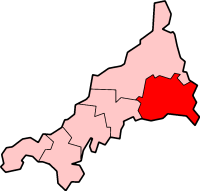
Caradon was a local government district in Cornwall, England, United Kingdom. It contained five towns: Callington, Liskeard, Looe, Saltash and Torpoint, and over 80 villages and hamlets within 41 civil parishes. Its District Council was based in Liskeard 50.453°N 4.465°W.

The DFB-Pokal, also known as the German Cup in English, is a German knockout football cup competition held annually by the German Football Association (DFB). Sixty-four teams participate in the competition, including all clubs from the Bundesliga and the 2. Bundesliga along with the four best teams from the 3. Liga. It is considered the second-most important club title in German football after the Bundesliga championship. Taking place from August until May, the winner qualifies for the DFL-Supercup and the UEFA Europa League unless the winner already qualifies for the UEFA Champions League in the Bundesliga.

The Bundesliga, sometimes referred to as the Fußball-Bundesliga or 1. Bundesliga, is a professional football league in Germany located at the top of the German football league system. The Bundesliga comprises 18 teams and operates on a system of promotion and relegation with the 2. Bundesliga. Seasons run from August to May. Games are played on Fridays, Saturdays and Sundays, with a focus on Saturdays. All of the Bundesliga clubs take part in the DFB-Pokal cup competition. The winner of the Bundesliga qualifies for the DFL-Supercup.

Hertha, Berliner Sport-Club e. V., commonly known as Hertha BSC or Hertha Berlin, is a German professional football club based in the locality of Westend of the borough of Charlottenburg-Wilmersdorf of Berlin. Hertha BSC plays in the 2. Bundesliga, the second tier of German football, following relegation from the Bundesliga in 2022–23. Hertha BSC was founded in 1892, and was a founding member of the German Football Association in Leipzig in 1900.
Rillaton Barrow is a Bronze Age round barrow in Cornwall, UK. The site is on the eastern flank of Bodmin Moor in the parish of Linkinhorne about four miles (6 km) north of Liskeard.
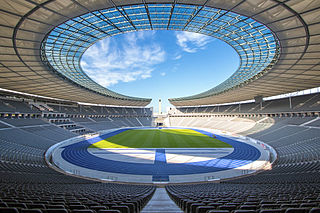
Football is the most popular sport in Germany with 57% of the population declaring interest in watching it. The German Football Association is the sport's national governing body, with 6.6 million members organized in over 31,000 football clubs. There is a league system, with the Bundesliga, 2. Bundesliga and 3. Liga on top. The winner of the Bundesliga is crowned the German football champion. Additionally, there are domestic cup competitions, most notably the DFB-Pokal and DFL-Supercup.
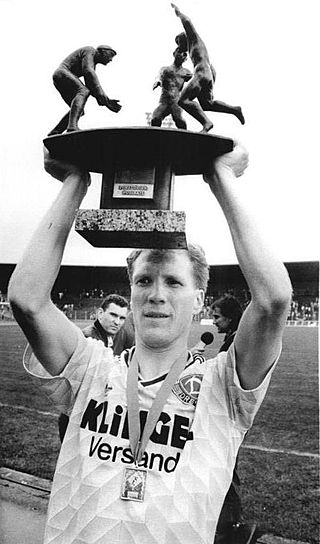
The FDGB-Pokal was an elimination football tournament held annually in East Germany. It was the second most important national title in East German football after the DDR-Oberliga championship. The founder of the competition was East Germany's major trade union.
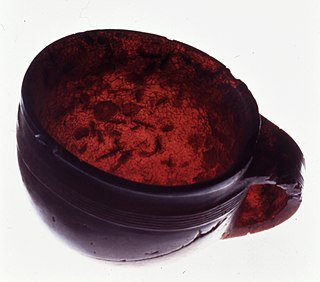
The Hove amber cup is a Bronze Age cup that was discovered in a great round barrow mound that was crudely excavated in 1856, in Hove, East Sussex, England, and is now in Brighton Museum and Art Gallery. It was found during the construction of Palmeira Square. The barrow was of exceptional size and quality, suggesting a date in the mid-Bronze Age. The Hove amber cup is one of only two found in Britain; the other was in Dorset. However, the two are not of the same style of craftsmanship.

Alba Berlin is a professional basketball club that is based in Berlin, Germany. The club was founded in 1991, and is today the largest German national basketball club by membership figures. Alba Berlin hosts its home games at the Uber Arena and competes in the Basketball Bundesliga (BBL) and the EuroLeague.

The Ringlemere Gold Cup is a Bronze Age vessel found in the Ringlemere barrow near Sandwich in the English county of Kent in 2001. Its discovery marked the beginning of research into and excavation of ring marks in the surrounding soil and what was later termed the Ringlemere Barrow. This find inspired further research by the British Museum and others into the connection between the Ringlemere Cup and others like it, published as a book in 2006.
Football at the 1936 Summer Olympics was won by Italy. This was the first Olympic football tournament after its prestige had been lessened by the 1930 introduction of the World Cup and its absence from the 1932 Olympics.

Football in Berlin, the capital of Germany, has a long history. The city contributed 24 of the 86 founders of the DFB, the German Football Association. The DFB Cup Final has been held every year at the Olympiastadion since 1985.
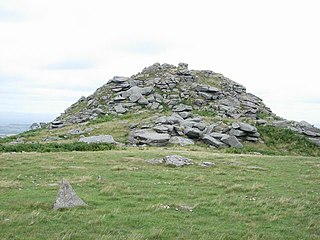
Linkinhorne is a civil parish and village in southeast Cornwall, England, United Kingdom. The village itself is situated at grid reference SX 320 736 and is approximately four miles (6.5 km) northwest of Callington and seven miles (11 km) south of Launceston. The parish population at the 2011 census including Downgate was 1,541

Lesnewth Hundred is one of the former hundreds of Cornwall, Trigg was to the south-west and Stratton Hundred to the north-east. Tintagel, Camelford, Boscastle, and Altarnun were in the Hundred of Lesnewth as well as Lesnewth which is now a hamlet but in pre-Norman times was the seat of a Celtic chieftain who was said to rule the whole of Trigg.

Rillaton is a hamlet in the parish of Linkinhorne in Cornwall, England. Nearby is the Bronze Age round barrow where the Rillaton Gold Cup was found in 1837.

A cup is an open-top vessel (container) used to hold liquids for drinking, typically with a flattened hemispherical shape, and often with a capacity of about 100–250 millilitres (3–8 US fl oz). Cups may be made of pottery, glass, metal, wood, stone, polystyrene, plastic, lacquerware, or other materials. Normally, a cup is brought in contact with the mouth for drinking, distinguishing it from other tableware and drinkware forms such as jugs. They also most typically have handles, though a beaker has no handle or stem, and small bowl shapes are very common in Asia.
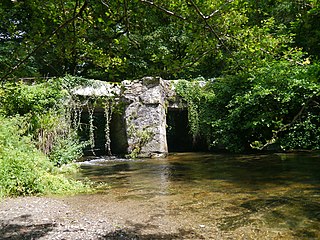
Stara Bridge is a clapper bridge across the River Lynher in east Cornwall, England, dating to the Late Middle Ages and now scheduled under the Ancient Monuments and Archaeological Areas Act 1979 as a rare surviving example of such bridge types. The surrounding area is known as Starabridge.
Fairy cup legends are folk and other tales usually relating to the theft of a "fairy cup", sometimes in the form of a drinking horn, usually from a "fairy mound". The legends are found in northwestern Europe.

Lynher is an electoral division of Cornwall in the United Kingdom and returns one member to sit on Cornwall Council. The current Councillor is Sharon Daw, a Conservative.